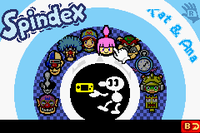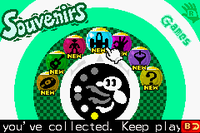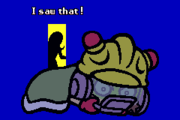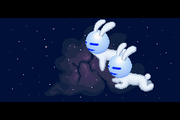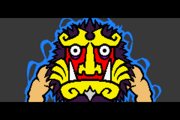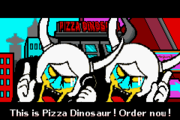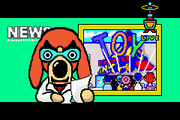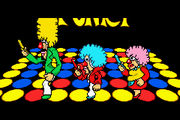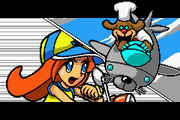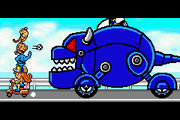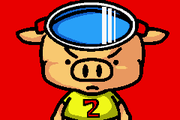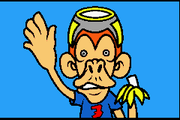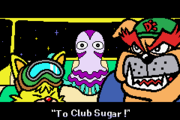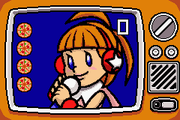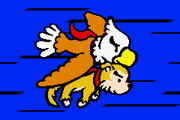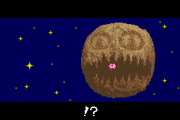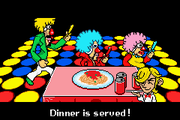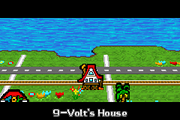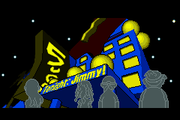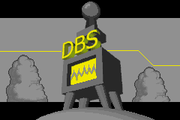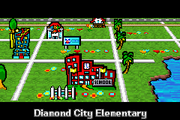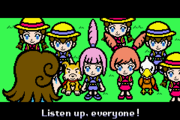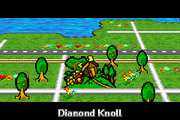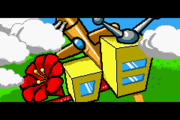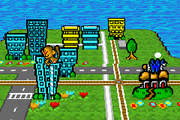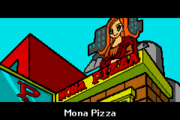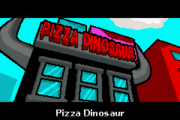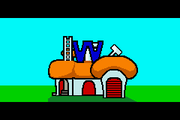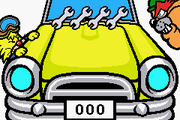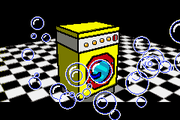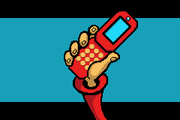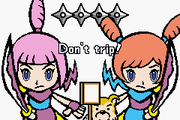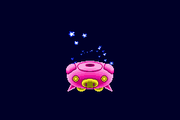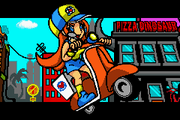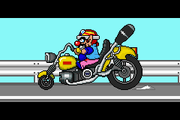WarioWare: Twisted!: Difference between revisions
Lord Falafel (talk | contribs) (→Regional differences: Fixed links) Tag: Mobile edit |
RandomJacen (talk | contribs) m (Past tense in Orbulon section) |
||
| Line 72: | Line 72: | ||
|- | |- | ||
| align="center" |[[File:WWT Orbulon Story.png|170px]] | | align="center" |[[File:WWT Orbulon Story.png|170px]] | ||
| colspan=3 | '''Orbulon's Story:'''<br> Orbulon, while floating through space on his [[Orbulon's Oinker|Oinker]], feels tired from commanding the ship and decides to take a nap. The player can tilt the Game Boy to give Orbulon a massage. His sunglasses slip each time the player massages him eventually exposing his right eye. Shortly afterwards, his [[Alien Bunny]] crew fall asleep alongside him. A few hours later, an alarm wakes them, and they realize that they are entering a black hole. Orbulon tries to initiate the warp drive, but the system prompts a password. He soon remembers the password and the ship flies away. A living planet, however, eats and spits it toward Diamond City, with the Alien Bunnies | | colspan=3 | '''Orbulon's Story:'''<br> Orbulon, while floating through space on his [[Orbulon's Oinker|Oinker]], feels tired from commanding the ship and decides to take a nap. The player can tilt the Game Boy to give Orbulon a massage. His sunglasses slip each time the player massages him eventually exposing his right eye. Shortly afterwards, his [[Alien Bunny]] crew fall asleep alongside him. A few hours later, an alarm wakes them, and they realize that they are entering a black hole. Orbulon tries to initiate the warp drive, but the system prompts a password. He soon remembers the password and the ship flies away. A living planet, however, eats and spits it toward Diamond City, with the Alien Bunnies having ditched the Oinker moments after it was spat towards Diamond City. | ||
|- | |- | ||
| align="center" |[[File:9-Volt Title.png|170px]] | | align="center" |[[File:9-Volt Title.png|170px]] | ||
Revision as of 21:48, December 4, 2019
- This article is about the game. For the souvenir featured in the same game, see WarioWare: Twisted! (souvenir). For the microgame featured in WarioWare: Smooth Moves, see WarioWare: Twisted! (microgame).
Template:Infobox WarioWare: Twisted!, known as Mawaru Made in Wario (まわるメイド イン ワリオ Mawaru Meido in Wario, lit. "Turning Made in Wario") in Japan, is the third game in the WarioWare series. It was released for the Game Boy Advance in Japan on October 14, 2004 and in North America on May 23, 2005. Unlike other WarioWare games, it uses a tilt sensor for the bulk of its gameplay, which allows for the console to be tilted in order to create input instead of pressing buttons (though buttons are occasionally used). The game revolves around Wario and his coworkers going on self-contained adventures throughout Diamond City, with the microgames being played as the characters attempt to solve whatever problem is occurring to them.
Story
While Wario is playing Avoid-A-Roid on his Game Boy Advance, he loses and, in frustration, tosses the system, heavily damaging it. He is immediately horrified when he sees the damage but decides to ask Dr. Crygor see if he can fix it. At his lab, Dr. Crygor tosses the Game Boy Advance into his new invention, the Gravitator, which creates new handheld systems with no buttons. He explains that the system is controlled through rotation, and Wario starts to play with it. Soon, Mona and 9-Volt enter the lab and start to play with the systems, quickly enjoying it. This gives Wario the idea to market the handheld system, dreaming of making a fortune from it. Each character hosts a set of microgames and comes with an individual story dedicated to them. At the end of each story, the respective character meets with the other ones at Club Sugar.
| Image | Host/Microgame Set | Greeting | |
|---|---|---|---|
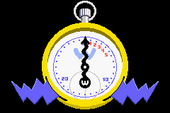
|
Wario Smorgasbord Sampler |
"You want the Wario, so here I am! This is my smorgasbord sampler! I got rid of the time limit to make things easier on you lazy crumb bums!" | |
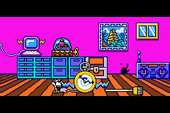
|
Wario's Story: Wario is exercising in his house when a mouse trips him. Angered, he chases after it with a broom and, in the process, knocks a giant watch up his chimney. He catches the mouse, but the watch then lands on him, transporting him into the watch and giving it Wario's mustache. Soon, four small Warios exit the watch, and the mouse chases them. The Warios are chased back into the watch and exit as one normal-sized Wario, and the angry Wario kicks away the watch. It bounces around and lands on the mouse, giving the watch mouse ears and a tail. | ||
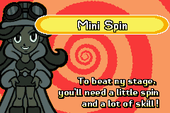
|
Mona Mini Spin |
"Ciao! Mona here! My games require perfect precision and petite spins! The controls are simple, but you'll need just the right touch if you want to win!" | |
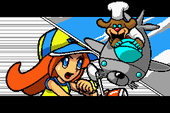
|
Mona's Story: Mona Pizza and Pizza Dinosaur, two rival pizza restaurants, get a call to deliver some pizza. However, Pizza Dinosaur's caller has intended to order from Mona Pizza, which angers Pizza Dinosaur's employees. The player can tilt the Game Boy to add toppings on to the pizza. Mona drives off on her scooter to deliver her customer's pizza, but The Dinosaurs chase her, one of whom brings along a T-rex. Mona calls her manager, Joe, to summon her pet elephant, pig, and monkey, and together she gets rid of one of her pursuers and the T-rex. However, the other then jumps into a giant mechanical dinosaur. Mona's pig and elephant cannot defeat it, but her monkey throws a banana peel, slipping it. With her pursuers gone, Mona successfully delivers her pizza to the customers. | ||
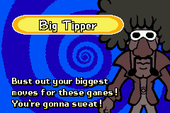
|
Jimmy Big Tipper |
"Aw, yeah... This here is Jimmy T.'s stage. My games are larger than life, and you'll need to spin big to win big! Hold on tight to your Game Boy Advance!" | |
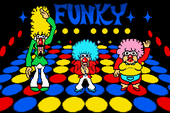
|
Jimmy's Story: At Club Sugar, Jimmy is the highlight of the night. Various people are dancing on the dance floor when Jimmy, alongside his parents, enter center-stage. The player can tilt the Game Boy to shine the spotlight between them before they proceed to dance and show off their cell phones. While they are on their cell phones, dinner starts to be served. They are so focused on taking pictures, however, they ignore their food. Eventually, their food gets cold and the bartender expels them at closing time. | ||
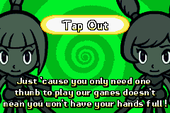
|
Kat and Ana Tap Out |
"Hi! It's me, Kat, the cutest ninja in kindergarten! Our games use just | |
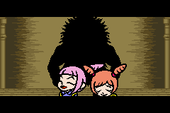
|
Kat and Ana's Story: Kat and Ana's class take a field trip to the Diamond Knoll, and they begin exploring with their pets, Shadow the Dog and Shuriken the Falcon. While Ana is distracted by some flowers, Kat pokes a beehive with a stick, provoking the bees inside and causing them to chase Kat and Ana. Here, the player can tap the | ||
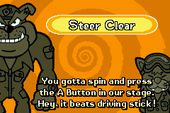
|
Dribble and Spitz Steer Clear |
"Howdy! Dribble here. Me an' Spitz gots loads of games all about spinning and pressing | |
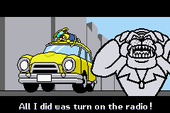
|
Dribble and Spitz's Story: Dribble and Spitz are driving down Interstate 310 with their taxi when Spitz starts to mess with the radio,. The player can cycle between various radio channels by tilting the Game Boy (the music it stops on will play during the intermission stages). Suddenly, their taxi malfunctions in the middle of the road, prompting Dribble and Spitz to look under their car hood to find the problem. After repairing their taxi, they continue driving, during which Dribble decides to "mix up" his route and sets his car to be rocket-powered, blasting them into space. They pick up an alien customer who asks to go to Club Sugar, and they speed toward their destination. | ||
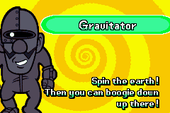
|
Dr. Crygor Gravitator |
"Hello. Crygor here. DOCTOR Crygor. In my games, I've found a way to manipulate the very power of GRAVITY ITSELF!!! It...sounds more complicated than it is. Just try it, and you'll see. Oh, yes... You'll ALL see... Moohahaha!!!" | |
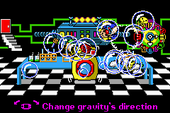
|
Dr. Crygor's Story: Dr. Crygor, working in his lab, completes a new invention he calls the Gravitator. He celebrates by performing a dance and activating it. The Gravitator, shaped as a washing machine, releases a bunch of bubbles into the room, capturing Dr. Crygor and a slew of other items. The machine also causes the room's gravity to be distorted and the player can alter the gravity by tilting the Game Boy. Soon, the bubbles pop, and Dr. Crygor, ecstatic, tosses more items into the Gravitator. Soon after activating it, the Gravitator creates a giant mecha, which Dr. Crygor proceeds to enter and fly around with. He then crashes into Shuriken, destroying the entire mecha, but Shuriken saves him. | ||
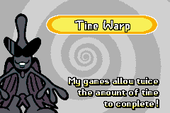
|
Orbulon Time Warp |
"Greetings. I am Orbulon. My stage demands patience. I've given you more time to think about your actions. My games are a break from the hectic hurly-burly of your modern human existences." | |
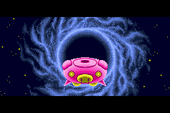
|
Orbulon's Story: Orbulon, while floating through space on his Oinker, feels tired from commanding the ship and decides to take a nap. The player can tilt the Game Boy to give Orbulon a massage. His sunglasses slip each time the player massages him eventually exposing his right eye. Shortly afterwards, his Alien Bunny crew fall asleep alongside him. A few hours later, an alarm wakes them, and they realize that they are entering a black hole. Orbulon tries to initiate the warp drive, but the system prompts a password. He soon remembers the password and the ship flies away. A living planet, however, eats and spits it toward Diamond City, with the Alien Bunnies having ditched the Oinker moments after it was spat towards Diamond City. | ||
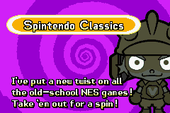
|
9-Volt Spintendo Classics |
"Heya! 9-Volt here! You know me... I'm a huge fan of Nintendo games, so that's what my stage is all about! I've mixed all my favorite games to give 'em a new spin! Even games you thought you know are gonna look totally twisted!" | |
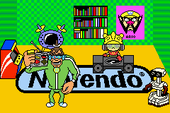
|
9-Volt's Story: In 9-Volt's class at Diamond City Elementary, a new student, 18-Volt, is introduced. He starts to play some of his music, but the teacher advises him to shut off his music off. 18-Volt leaves the class dejected, but 9-Volt, who likes his music, invites him to his house, and soon, 9-Volt and 18-Volt are hanging out. The player can tilt the Game Boy to spin the vinyl record (the same turntable used when listening to the record souvenirs). While checking out 9-Volt's games, 18-Volt finds a Nintendo Entertainment System, and he enthusiastically asks if they can play with it, and 9-Volt agrees. They play until late at night, at which point 5-Volt storms in and scolds them that it is time for 9-Volt to be asleep. | ||
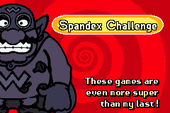
|
Wario-Man Spandex Challenge |
"My new look is pretty super, huh! It's only a matter of time before Bollywood comes knocking down my door! I'd better get an agent! But if he thinks he's getting 10%, he's... Oh, you wanted an explanation of my stage? Tough luck!" | |
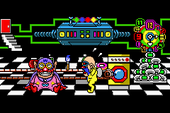
|
Wario-Man's Story: At Dr. Crygor's lab, Dr. Crygor is continuing to create Wario's new game using the Gravitator. Wario is on the conveyor belt being used to transport objects, however, and gets chucked into the Gravitator. He exits as Wario-Man and feels an immense surge of power, promptly jumping back into the Gravitator to gain more power. The Gravitator then flies into space and transforms into a giant robot, with Wario-Man as the pilot. He waves excitedly to a passing Oinker piloted by Orbulon and carrying some of his friends. The Oinker detects Wario's robot as foreign, though, and blasts him back to Diamond City. He lands in the water outside Dr. Crygor's lab and shouts that he is going to jokingly fire everyone working for him. | ||
Microgames sets
| Image | Name | Description |
|---|---|---|
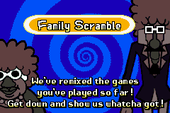
|
Jimmy's Folks | Mama T. and Papa T., Jimmy T.'s parents, host a collection of microgames from Mona, Jimmy T., and Kat and Ana (which are unlocked before replaying their stages). All of the microgames are at the second level of difficulty. It is the only Thang remix in this game. Beating the boss microgame (which is always Mona's) unlocks Dribble and Spitz's stage. When replaying this stage, the microgames will become faster after the second boss microgame. |
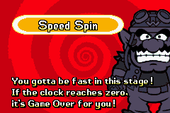
|
WarioWatch | WarioWatch is unlocked after completing Dr. Crygor's stage. Unlike Family Scramble it features microgames in their first level. It includes its own collection of microgames, along with the six microgames of Wario and its own rules; the WarioWatch ticks down during microgames, and the normal timer only shows up after fourteen seconds have passed. Completing a microgame increases the time and letting it reach zero loses. After completing the boss microgame Orbulon's stage is unlocked. When replaying this stage, getting at least fifty points unlocks the WarioWatch 2 stage. |
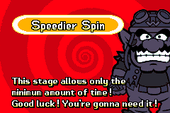
|
WarioWatch 2 | WarioWatch 2 has the same rules as the first WarioWatch, but the timer is restricted to a maximum of five seconds per microgame. In addition to this, all of the microgames are on any difficulty. Nine microgames of WarioWatch don't appear in this microgame set. |
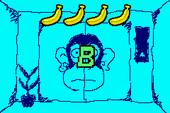
|
Skyscraper | Represented by a blue monkey, Skyscraper hosts a collection of microgames from everyone else, excluding WarioWatch and boss microgames. The microgames' speed gradually increases as they're completed, and it continues until all four lives are lost. Scoring at least twenty-five points unlocks the Tower stage. |
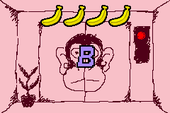
|
Tower | Represented by a red monkey, Tower uses the same set of rules from Skyscraper, except that the microgames start off much more quickly and they gradually continue to become faster until they reach the maximum speed. Getting at least twenty-five points will unlock the Mansion stage. |
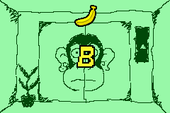
|
Mansion | Represented by a green monkey, Mansion uses the same set of rules from Skyscraper, except that only one life is available and the microgames start off on the highest difficulty. However, the speed never increases beyond the minimum. |
Gameplay
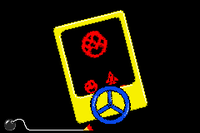
The core gameplay of Twisted, like the other installments in the series, revolves around completing small, simple minigames called microgames that increase in speed and difficulty as they are completed. Most only last for about four seconds, with the exceptions being Fronk (whose microgames last around two seconds) and Orbulon (whose microgames last around eight seconds). They also only provide a short instruction, usually only a couple of words or a single word, at the very beginning. The microgames are sorted by the various hosts of the story's stages, which each host having a recognizable distinction between their microgames. Stages are unlocked linearly; after beating one character's stage, which involves completing a certain number of microgames before facing a "boss" microgame, another stage is unlocked, and this continues until every stage is unlocked. The game uses a gyroscopic sensor built into the cartridge that allows the player to physically move the console to control the game. While the buttons are still frequently used, most of the emphasis is placed onto the tilt sensor.
It is one of four games to use such a sensor, alongside Yoshi Topsy-Turvy, Kirby Tilt 'n' Tumble, and Koro Koro Puzzle Happy Panechu!. It is also one of only two Game Boy Advance games to use a Rumble Feature, the other being Drill Dozer.
Microgames
- Main article: List of WarioWare: Twisted! microgames
With 223 microgames, Twisted has the second most microgames out of the entire WarioWare franchise, surpassed only by WarioWare Gold. Each microgame has three levels of difficulty, with their speed increasing after the third level is complete. The microgames are sorted via character, with only their own microgames appearing in each of their stages. The exceptions to this are Fronk, who has nine microgames that can appear at any point, and the various microgame sets, who use a collection of microgames from other characters rather than unique microgames.
Souvenirs
- Main article: List of WarioWare: Twisted! souvenirs
Souvenirs are items separate from the microgames that have varying levels of interactivity. The souvenirs are divided into seven categories: Records (various music tracks from the main game and microgames), Instruments (musical devices that can be used to play notes or songs), Figurines (dolls and action figures that can each be uniquely manipulated), Games (short minigames that are often based around other microgames), Doodads (utility gadgets that can be used as actual tools), Toys (amusing items that have limited interactivity in comparison to the Games), and Other (miscellaneous items that do not belong in any other category). There are 139 different souvenirs in the American release of Twisted, though the Japanese release has two exclusive souvenirs: Mushroom and Mochitsuki Set.
Characters
Main characters
All of the main characters (i.e. every character who has a unique set of microgames and a unique stage) have jobs at WarioWare, Inc. and the microgames seen by the player have all been programmed by them.
- Wario WarioWare Twisted.png
- Jimmy T WarioWare Twisted.png
- Kat and Ana WarioWare Twisted.png
- Dribble and Spitz WarioWare Twisted.png
- Dr. Crygor WarioWare Twisted.png
- Orbulon WarioWare Twisted.png
- 9-Volt WarioWare Twisted.png
- 18-volt.png
Supporting characters
Locations
The vast majority of the game's story takes place in Diamond City. This excludes Orbulon's stage, set in outer space.
Objects
Most of the main characters are in possession of an item unique to them. The following list only includes objects that appear during the story and not in the microgames or souvenirs.
Regional differences
As with most localizations, there are many differences between WarioWare: Twisted!'s Japanese and American releases; most of them are minor graphical or text changes, such as the "points" symbol being removed next to high score or "Speed Up" being changed to "Faster", but many notable changes were made to the story, the microgames, and the souvenirs.
Stages
- On top of Mona's Mona Pizza, a spoof of the Mona Lisa with Mona in her place was placed on the roof, and the pizza boxes also reflect this change.
- In the Japanese version, 9-Volt's stage centers around him and 18-Volt playing on a Family Computer (a Japan-exclusive console), while in the American version, an Nintendo Entertainment System is used. As the stage proper takes place inside the console, the colors are appropriately changed, and the four elf-like creatures that represent the player's lives are also changed to Wario lookalikes, although oddly R.O.B. retains its Japanese colors in all versions.
Microgames

- Practical Joker originally featured poop on the Joker card, which is a pun on baba being able to refer to either a joker or fecal matter, depending on how it is written. The American release changes it to a regular joker.
- The counter in Ice Queen locks to 00 in the Japanese version if the player exceeds 100 spins; this is fixed in the American release.
- Bubblegum Blues features a sleeping boy with a bubble of gum coming out of his mouth and gum splatter is left on the boy's face once the bubble is popped; originally, it was a snot bubble coming from the boy's nose and nothing is left behind after the bubble popped.
- In the Japanese version, Slap Jack! was based around the story of Sun Wukong; Sun Wukong made a bet with the Buddha that he could escape from the Buddha's palm and promptly fails, leading to him being imprisoned for five hundred years. The microgame, in turn, features Sun Wukong riding on a cloud (one of his abilities) while the Buddha attempts to swat him away with his palm. The American version retools this to fit the story of Jack and the Beanstalk, with Jack in place of Sun Wukong and the giant in place of the Buddha.
- Crazy Straw and Mooo-ve It! feature a character drinking in a city at night, which is changed to a rural area in the day. Some of the drinks are also changed in color.
- The third difficulty of Key Ring features a wrestler in a sleeping bag surprised to see someone about to enter the window, which was originally the wrestler surprised to see someone inside the bag with him.
- Handy Man originally featured an egg, a rat, and a rice ball; the rice ball is kept out of the American release.
- Trash Day features rocks in the American version where there was once poop in the Japanese version.
- Safecracker features a golden pile of poop during the third difficulty in the Japanese version, while the American version features a pile of gold coins and a money bag. Similarly, Inch, Worm! changes the prize in the third difficulty from some dung to a bag of money. In "WarioWare Gold", the poop was left unchanged in all versions.
- Some of the move sequences in Wario Mambo for levels 2 and 3 in the Japanese version differ from the American version.
Souvenirs

- The Mushroom, a Figurine that can be collapsed and have its head removed if the console is twisted fast enough, was removed entirely from American releases.
- The Written Oracle was changed into a Fortune Cookie, with a color-coded stick exiting from the fortune being replaced with a color-coded paper, though the fortunes' colours and what they represent remained the same.
- The Carrot Grater and the Big Carrot Grater were modified from corresponding turnips.
- The statue of Ksitigarbha, known in Japan as Jizō, was turned into a Garden Gnome for the American release.
- The Mochitsuki Set, which involves a boy and an elder making some mochi, was eliminated completely from American versions.
References to other games
- Wario Land 3: The Music Box World from this game makes a small cameo on Wario's desk.
- Wario Land 4: A picture of the Golden Pyramid from this game appears on a wall beside Wario's desk.
Development
Development on Twisted started after it was suggested that a second WarioWare game for the Game Boy Advance, even though the previous GBA installment, WarioWare, Inc.: Mega Microgame$!, was still selling units[1]. The project was soon underway, with the team amassing a collection of potential microgames, but they were not able to find something that would make it unique from the rest of the series[1]. Around this time, the team was presented with the Nintendo DS, and they thought that the stylus would be perfect for a WarioWare game, developing it as a launch title even though there was already progress being put into Twisted[1]. Development of this game, which would become WarioWare: Touched!, briefly overlapped with that of Twisted[2][3]. As the series' core staff was already busy with Twisted, Touched was primarily developed by people new to the series[3]. Following its completion, Twisted's staff was immediately moved to Touched to ensure the game was ready for the Nintendo DS's launch[2].
When the team was still looking for the game's key element, one of the staff, Kazuyoshi Osawa (who went on to conceptualize and become the chief director of the Rhythm Heaven series), presented an experimental motion sensor he was working on set up to work with microgame-like demos[1]. The rest of the team loved the idea and soon sent it to Satoru Iwata for approval[1]. Iwata spent a long time with a record player (which became the basis for the Record souvenirs), setting the console on a swivel chair, spinning it around, and enjoying as the game's music matched the chair's rotation[1][3]. Sakamoto knew that he had a success on his hands when Iwata spun around in his chair and called the demo "idiotic"[3]. The game was finished in August 2004[2].
Reception
Critical reception
Twisted received generally positive reception from critics. It was praised heavily for using the tilt controls in a unique and fun fashion[4] as well as its charming and quirky visuals[5], though many wished for increased multiplayer options[6]. 1UP's Jeremy Parish, in his review of Yoshi Topsy-Turvy (which also uses a tilt sensor), commented that Twisted! felt like the tilt sensor was built for it, rather than the other way around[7]. IGN editor-in-chief Craig Harris (who gave the game a 9.5 out of 10 in his review) listed it as number 1 on IGN's "Top 25 Game Boy Advance Games of All-Time"[8].
The game won the grand prize in the 8th Japan Media Arts Festival's entertainment division for its aesthetic appeal and its innovative controls[9]. Director Goro Abe was nominated alongside the game and came to pick up the award at the ceremony[10]
| Reviews | |||
|---|---|---|---|
| Release | Reviewer, Publication | Score | Comment |
| Game Boy Advance | Craig Harris, IGN | 9.5/10 | "WarioWare Twisted is not only incredibly innovative, it's an insanely successful design that really shows off the potential of the Game Boy Advance platform." |
| Game Boy Advance | Jeff Gerstmann, GameSpot | 8.8/10 | "The spin sensor feels less like a gimmick and more like a tightly integrated feature that makes the entire game feel inventive and unique. Owners of any of Nintendo's GBA-compatible handheld systems are sure to have a great time with WarioWare: Twisted!." |
| Game Boy Advance | Jeremy Parish, 1UP | 8.0/10 | "The brilliant minigames and whimsical atmosphere turn the gravity sensor into something more than a gimmick, while the sensor in turn adds a vital touch of originality to a game format in danger of becoming stale." |
| Game Boy Advance | Kristan Reed, Eurogamer | 9/10 | "It may not be the longest lasting game ever, you might rip through the main story modes and roll your eyes at the silly unlockables that are among the most pointless items ever seen in a videogame, but it's a game you'll always remember with a smile - and that's all you can ask from a game." |
| Aggregators | |||
| Compiler | Platform / Score | ||
| Metacritic | 88 | ||
| GameRankings | 87.79% | ||
Sales
In Japan, WarioWare: Twisted sold around 108,000 copies on its opening week and had lifetime sales of 463,938 according to Famitsu sales data[11].
Media
- For a complete list of media for this subject, see List of WarioWare: Twisted! media.
European release
In 2005, when the game was released in Australia and America, Nintendo announced the game for release in Europe on June 24[12], which was later pushed back to December 8.[13] Three years later, in 2008, the Game Boy Advance was discontinued. The page for WarioWare: Twisted! on the Nintendo of Europe Website had been removed as well[14]. In the European version of Super Smash Bros. Brawl, when it is mentioned on the Chronicle, the game is marked as "Not Released".
Staff
- Main article: List of WarioWare: Twisted! staff
Twisted was developed as a co-production between Intelligent Systems and Nintendo SPD Group No.1. As with most of the series' games, Yoshio Sakamoto acts as a producer alongside Ryoichi Kitanishi, who first joined the series in this entry and continued as a producer for the following two installments, and Goro Abe acts as the chief director, with Osamu Yamauchi and Teruyuki Hirosawa as other directors.
Quotes
- Main article: List of WarioWare: Twisted! quotes
- "Easy games for lazy bums like me!"
- "Give it a spin, baby, and feel the burn, because this is more than a game. It's a workout! Aw, yeah..."
- "My invention makes me the master of GRAVITY ITSELF!!! And now, I'm sharing this power with you. You'll need to learn how to control gravity if you want to win... YOU HEARD ME!"
- "Does this suit make me look fat? Tell me the truth. I can take it."
- "Since I am such a bighearted fellow, I've given you not one, BUT TWO--yes, count 'em, TWO--ways to pause your game. You can replay me later."
Gallery
- For this subject's image gallery, see Gallery:WarioWare: Twisted!
- Wario 2 WarioWare Twisted.png
- 18-volt.png
Trivia
- The box art of the game shows Wario holding a Game Boy Advance SP, but in the game, the characters use the original Game Boy Advance instead.
- In the Guinness World Record 2010 Gamer's Edition, WarioWare: Twisted! was listed as having the most minigames in a single video game, which was 223.
- Like WarioWare, Inc.: Mega Microgame$!, some sound effects used in the game were taken from Wario Land 4.
References
- ^ a b c d e f Iwata Asks: WarioWare Smooth Moves. Nintendo. Retrieved September 8, 2015.
- ^ a b c (April 7, 2006). Nintendo R&D1 Interview. Kikizo. Retrieved September 9, 2015.
- ^ a b c d Nintendo, Iwata Asks: Metroid Other M (Retrieved September 3, 2014)
- ^ Beveridge, Phil (January 25, 2006). Wario Ware Twisted! (Game Boy Advance) Review. Cubed3. Retrieved September 9, 2015.
- ^ Ross, Patrick. WarioWare Twisted! Nintendojo. Retrieved September 9, 2015.
- ^ "jkdmedia" (June 23, 2005). WarioWare Twisted! - GBA - Review. GameZone. Retrieved September 9, 2015.
- ^ Parish, Jeremy (June 10, 2015). Yoshi Topsy Turvy. 1UP. Retrieved September 9, 2015.
- ^ Harris, Craig (March 16, 2007). Top 25 GBA Games of All-Time. IGN. Retrieved September 9, 2015.
- ^ 8th Grand Prize - Wario Ware: Twisted. Japan Media Arts Festival Archive. Retrieved September 9, 2015.
- ^ Grand Prize Wario Ware:Twisted Game (Wayback Archive). Japan Media Arts Plaza. Retrieved September 11, 2015.
- ^ Lemaire, Oscar (January 25, 2014). Ventes des jeux Wario au Japon. GamesCharts. Retrieved September 05, 2014 (WayBack Archive link).
- ^ Games Press (May 4, 2005). PRESS RELEASE: Wario Becomes Even More Twisted Than Ever Before! (Wayback Archive). GamesIndustry.biz. Retrieved September 9, 2015.
- ^ "rawmeatcowboy" (9 October, 2006) WARIO WARE TWISTED FINALLY MAKES IT TO EUROPE. GoNintendo. Retrieved September 9, 2015.
- ^ Nintendo UK's full list of games. Retrieved September 9, 2015.
